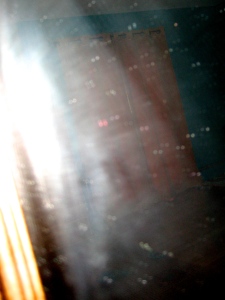
– Photo by Chuck Ketchel
The snowfall was becoming heavy and sticking. I prepared to retreat to my home office, but, of all days, she insisted on seeing me in person.
She arrived, sank into the couch and cried. She had been there with King, and though she sat warmed by the zip-up sweater from Obama’s election campaign she was crushed by the outcome of Ferguson. “Nothing has changed,” she whispered despondently.
She went on to tell me she had to come, there was no one else alive to talk to, that is, those who were there, those who had marched with her alongside King. I have never felt so deeply honored, it was me she’d insisted on taking to, a white man, a little too young to have marched with King, now entrusted with helping her find meaning in the current tragedy. And the blinding white snow intensified outside the window as we talked.
The dialogue had started a few weeks earlier. She’d opened her computer to my website and up popped a blog. She came to see me afterwards, insisting that I explain what I had meant in a particular paragraph. I brought up on my computer the blog I’d written that week. “No, that’s not it,” she stated. It took about ten minutes to find it, but when she mentioned Dr. Kenneth Clarke having been referenced I put his name into the search engine and Eureka! “Yes, that’s it,” a blog I’d written when Obama first got elected, America Chooses the Black Doll. This blog had mysteriously popped up for her a few days earlier, a blog I’d written six years ago!
She immediately drew attention to a paragraph concerning the projection of evil onto blackness. “Explain what you mean,” she demanded. I told her that blackness, from an archetypal standpoint, is the unknown, whether it be rejected and disowned, or simply not yet encountered but lying somewhere in the unknown or dark area of the psyche. This projection falls upon race, but race is not the origin of this projection. She had told me that I needed to clarify that more and referenced a work by Toni Morrison.
On this snowy morning, she handed me a precious, personally autographed, copy of Toni Morrison’s Playing in the Dark: Whiteness and the Literary Imagination. “Read this and return it to me,” she said.
I have done my homework. Here’s my report. I can only answer to Ferguson in my own way, how I see and experience the world, where we are now, and what we must do to survive.
What Toni Morrison cogently captures in her incisive review of the black and white of American literature is that together they form an interdependent whole; one cannot exist without the other. The backdrop of the freedom of the American Dream is the utter control of the darkness that houses both its fears and deeply instinctual longings. In racial terms, that darkness—that resides in the depths of the psyche in the shadow of all people of all races—gets projected onto black people.
How is this not the dynamic played out in Ferguson? Had Michael Brown been white, would he be dead today? What terror gripped Darren Wilson, as he stared into the darkness he projected onto Michael Brown, that made him have to kill his assailant to feel safe and free?
Toni Morrison quotes the white author Marie Cardinal from her autobiographical work, The Words To Say It:
“My first anxiety attack occurred during a Louis Armstrong concert. I was nineteen or twenty. Armstrong was going to improvise with his trumpet, to build a whole composition in which each note would be important and would contain within itself the essence of the whole. I was not disappointed: the atmosphere warmed up very fast. The scaffolding and flying buttresses of the jazz instruments supported Armstrong’s trumpet, creating spaces which were adequate enough for it to climb higher, establish itself, and take off again. The sounds of the trumpet sometimes piled up together, fusing a new musical base, a sort of matrix which gave birth to one precise, unique note, tracing sound whose path was almost painful, so absolutely necessary had its equilibrium and duration become; it tore at the nerves of those who followed it.
“My heart began to accelerate, becoming more important than the music, shaking the bars of my rib cage, compressing my lungs so the air could no longer enter them. Gripped by panic at the idea of dying there in the middle of spasms, stomping feet, and the crowd howling, I ran into the street like someone possessed.”
Fortunately, for Ms. Cardinal, she landed in the hands of noted psychoanalyst Bruno Bettelheim where she squarely faced the source of her reaction to Louis Armstrong’s performance—the riffs from the darkness of her own soul, unleashed to shake her awake to the depths of her own nature.
As the I Ching states in Hexagram #48, The Well: “For any merely superficial ordering of life that leaves its deepest needs unsatisfied is as ineffectual as if no attempt at order had ever been made.”
But to achieve a new order of true balance, we must take responsibility for that which rattles in the depths of our own darkness and bring it into union with the white light of consciousness. This is true integration, the union of dark and light, each adjusting to the needs of its other half.
When the light seeks to rule, dissociated from the truths of its own inner darkness, only repression and dissociation can keep the darkness at bay. But life cannot exist only in the light of day; we need the dark of night as well. Without both, darkness disowned is projected, kept under control through racist dogma.
We can no longer afford a racist solution to house our psychic dissociation. Terrors from the depths of our psychic mayhem have slipped into full-fledged control of our planet. Madness in the form of greed is destroying our fragile ecosystem—all this in the white light of day.
Projecting our shadow onto people of color—African, Middle Eastern, Hispanic, etc.—is an old world survival strategy. Owning, facing and integrating what lives in the darkness of all of our souls is the only evolutionary option at this juncture. It’s about survival.
Only a new relation of balance between the light and the dark within human nature will reverberate outwardly and settle the squalls of Mother Nature who, like Louis Armstrong’s trumpet, is tearing at all our nerves to listen to the truth of nature. As within, so without.
This is my answer to Ferguson: Take your place in the history books of an old world order; the time of great advance has come. Now is the time when the human race must take ownership of its wholeness, squarely facing that which lies in the darkness of all of us.
Integrating,
Chuck
P. S.: Just as I finished writing this blog the verdict on the Staten Island chokehold death of Eric Garner was announced, highlighting the same dynamic I write about, keeping it fully alive and in the eyes of all of us, pointing out that this is one of the most important issues we must face in our time.



